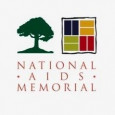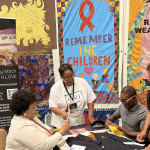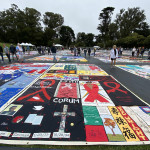Memphis ranks eighth in the nation for new HIV cases per year among large cities in the United States, according to the Infectious Disease Society of America. In light of this research and the recent announcement regarding HIV prevention funding in Memphis, the National AIDS Memorial, Southern AIDS Coalition (SAC), and Gilead Sciences are working to ‘change the pattern’ in Memphis by bringing sections of the National AIDS Memorial Quilt to town. The Quilt honors Black and Brown lives lost to HIV and AIDS and has traveled to several states throughout the South as part of Change the Pattern, a national campaign to end HIV in Black, Brown, and LGBTQ+ communities across the Southern United States.
The National AIDS Memorial Quilt
From March 29-April 1, the AIDS Quilt will be displayed at the Halloran Centre for Performing Arts & Education. The exhibit is free to the public and includes quilting workshops, educational forums, and student events. For more information about Quilt locations, event times, and special programming, visit Change the Pattern - Tennessee.
“In 2020, more than 600 Tennesseans were newly diagnosed with HIV. Nearly 60 percent of these diagnoses were among individuals who identify as Black,” said Dafina Ward, executive director, SAC. “Even with that, the state is rejecting more than $8 million that supports HIV prevention funding! The numbers show it is still critical to bring awareness to this cause. Through Change the Pattern, we want to help communities move the needle, and do our part to help eradicate stigma and end new HIV cases all together.”
Visitors to the Quilt will see hand-stitched panels honoring Black and Brown lives lost to AIDS, many of which were made by Memphis and Tennessee residents to honor and celebrate the stories of their friends and loved ones. Newly crafted Quilt panels will also be displayed to introduce the importance of the Quilt to a new generation while spreading awareness of how HIV affects lives across the South.
Throughout the week residents are invited to come fellowship and enjoy celebrating the quilt through quilting workshops. Free educational forums, movie nights, and health information will help spark conversation to reimagine the fight to end HIV/AIDS in Memphis.
“According to research from AIDSVu, nearly 71 percent of AIDS cases in 2020 were men, while roughly 30 percent were women,” said Jada Harris, program manager at National AIDS Memorial. “Although the number for women appears to be low, they are the fastest growing demographic of AIDS cases nationwide. During Women’s History Month, we want to do our part to bring awareness to how AIDS is affecting women, while educating the community and showing them how to make different choices that will lessen the risk of encountering AIDS.”
As an active display of the ongoing fight for civil rights for individuals living with AIDS, the National AIDS Memorial Quilt proudly displays a panel hand-made by Civil Rights icon Rosa Parks.
Love & Activism Luncheon
The exhibition kicks off on Wed., March 29, with the Love & Activism luncheon at Halloran Centre, from 11:30 a.m.-12:45 p.m. The event includes the reading of a proclamation, presentation of the Leadership Award, entertainment, and discussions from special invited guests. Media interested in attending, please email damali@precisecomm.net.
Alarming Statistics Tell the Story
Statistics show the importance of the Change the Pattern initiative in the Southern U.S. In 2020, more than 19,000 diagnosed people were living with AIDS in Tennessee. More than 650 were newly diagnosed. That same year, more than 6.500 diagnosed people were living with AIDS in Memphis alone, with 223 of them being new cases.
The disproportionate burden of HIV in the South is among Black women, Black and Latinx gay and bisexual men, and Black and Latinx transgender women. Louisiana, Mississippi, Texas, Georgia, South Carolina, Alabama, North Carolina, and Tennessee rank in the top 15 states with the highest rates of HIV in the country. Racism, HIV stigma, homophobia, poverty, and barriers to health care continue to drive these disparities.
About Change the Pattern
In the fight to end HIV and AIDS in the Southern U.S., the National AIDS Memorial has partnered with Southern AIDS Coalition to bring sections of the AIDS Memorial Quilt honoring Black, Brown, and LGBTQ+ lives lost to HIV and AIDS to communities throughout the region to raise awareness about the HIV crisis that persists today within communities of color and marginalized populations. Funded through a $2.4 million grant from Gilead Sciences, Change the Pattern is focused primarily on reaching communities disproportionately impacted by HIV and AIDS through free Quilt displays, quilt-making workshops, educational programming, and advocacy. Learn more at www.changethepattern.org.








Comments
Comments